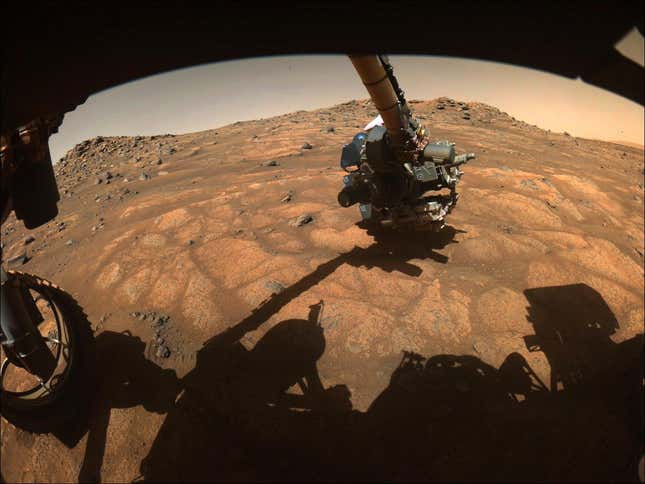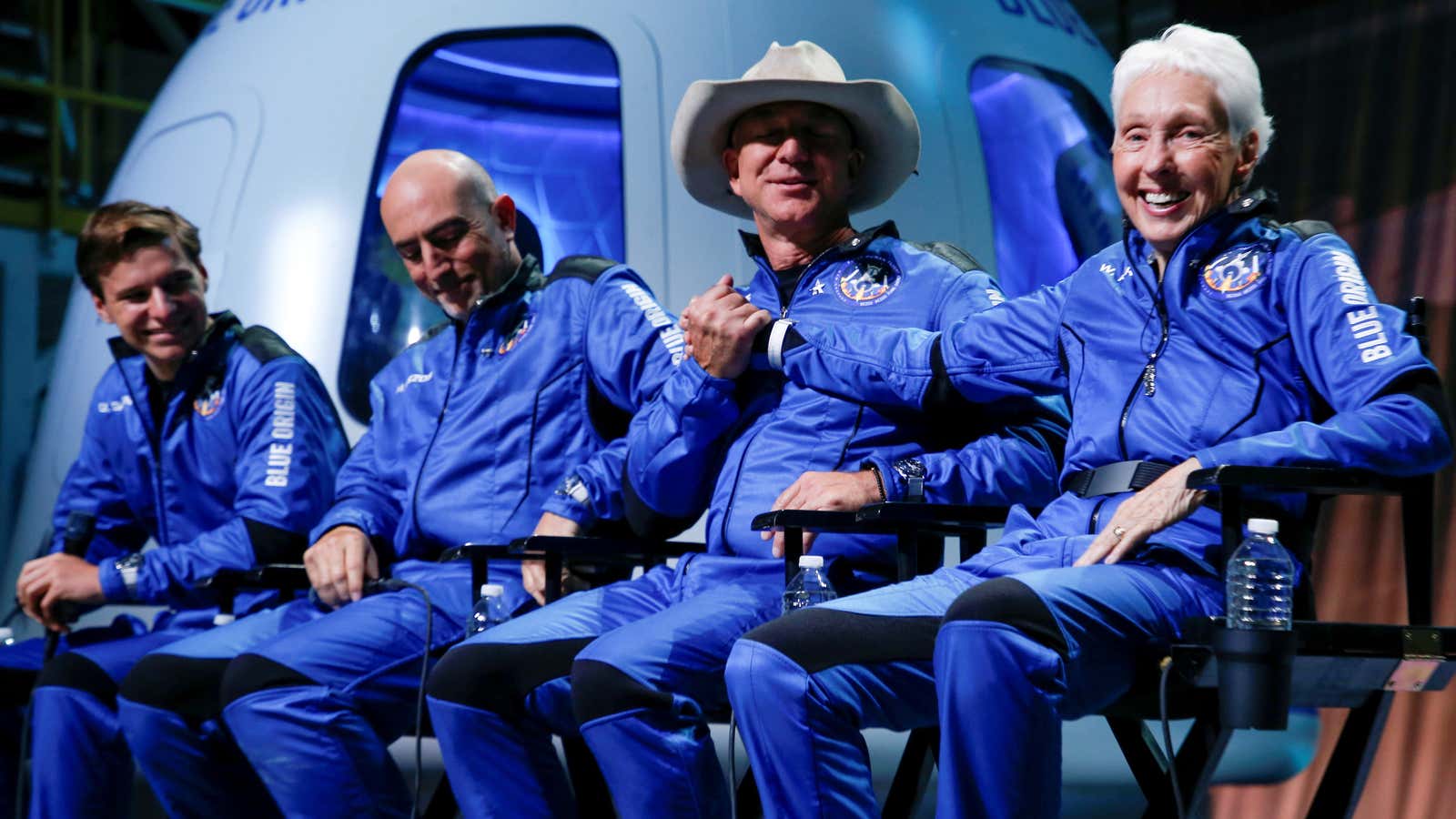Dear readers,
Welcome to Quartz’s newsletter on the economic possibilities of the extraterrestrial sphere. Please forward widely, and let me know what you think. This week: Bezos beyond the atmosphere, NRO protectionism, and the latest on Momentus’ Mikhail Kokorich.
🚀 🚀 🚀
Jeff Bezos went to space, and gave the industry the worst day of publicity it’s had in recent memory.
The animus had little to do with his space company, Blue Origin. Much of it was driven by Bezos’ wealth and how he got it, amplified by recent reporting into the poor treatment of Amazon’s logistics workers and how the company’s founder used (legal) strategies to avoid paying income tax.
A good deal of the Bezos hate is simply people upset with the idea of private enterprise at all, or based in false binaries about Bezos not spending his money to fight poverty or climate change. (Bezos, a latecomer to philanthropy, has committed $10 billion to organizations focused on decarbonizing the economy and $100 million to feeding the poor.)
Other critics clearly have basic misconceptions about space exploration: Some portion of the public incorrectly thinks that previous NASA successes did not involve private companies, or that people like Bezos, Richard Branson, or Elon Musk are replacing or redirecting NASA’s science work.
The reality is both more prosaic and more interesting: Bezos and Branson have had very little impact on NASA thus far beyond offering a new (and appreciated) venue for experimental payloads in microgravity, while Musk’s SpaceX has saved the agency billions and given it the ability to fly astronauts once again.
Part of the problem is the news media, particularly TV news, which has amplified the import of Branson and Bezos’ suborbital tourism projects beyond all reason. Viewers were naturally disappointed in a space race that results in just a few minutes of microgravity—even as others fretted nonsensically that billionaires are set to abandon the planet.
And then there was what actually happened at the launch, where the focus on Bezos, his family and his aspirations clouded over what Blue Origin had actually accomplished. Any business catering to the ultra-wealthy is bound to attract criticism, but the sudden pivot to announcing $100 million donations to pundit Van Jones and chef-activist José Andrés was so out of left field that it felt like what it was: an effort at distraction.
The real shame is that, as Bezos pointed out, hundreds of people worked incredibly hard to design, test, and operate the New Shepard rocket booster and space capsule. Blue Origin has refused multiple requests to interview these engineers and let them share the challenges they surmounted to create this vehicle; no executives joined the crew for a post-flight press conference.
The public reception to Bezos’ flight could damage the broader effort to expand the ways we utilize space on behalf of humanity. Public-private partnerships at NASA have led to major success, but they still face many critics who will now build on rhetoric like the “Bezos bailout.” The irony that this will ultimately benefit the traditional contractors of the military-industrial complex is clearly lost to Bezos’ progressive critics.
The New Shepherd may have lasting significance but much of that rests on what Blue Origin does with the lessons from building it. The focus on suborbital tourism distracts from the strides space users have made in adding value to everyday life. Bezos, clad in his cowboy hat and boots, calls to mind the image of the dude ranch and tourists cosplaying as cowboys after the transcontinental railroad revolutionized transportation in the 19th century.
The real businesses of space will look more like the railroad, not the dude ranch. Bezos famously uses customer focus as Amazon’s benchmark, but in making himself the key customer for Blue Origin, he forgot that the market for space is so much broader than the people for whom it is already a passion.
🌘 🌘 🌘
Imagery Interlude
Meanwhile, on Mars, NASA’s Perseverance rover is reaching out to snag a nearby rock:

Perseverance is performing the first robotic sample collection on Mars, putting rocks into a special canister designed to be left behind for a future exploration robot to collect and return to earth. Back in the lab, these samples can be analyzed to hunt for evidence of water, volatile chemicals or extra-terrestrial life.
🥇🥇🥇
The games are underway! Don’t forget to sign up for Quartz’s pop-up Olympic newsletter, Need to Know: Tokyo Olympics.
🛰🛰🛰
SPACE DEBRIS
No laws, no masters. The nascent business of space tourism is different from other aerospace activities in a key way: There are no government safety rules to protect passengers. This isn’t a new development, but now that Blue Origin and Virgin Galactic are approaching regular operations, the debate about how the Federal Aviation Administration will deal with this is going to heat up.
The NRO is blocking space trade. The US National Reconnaissance Organization, which acts as the clearinghouse for commercial data on behalf of the intelligence community, has said it won’t buy satellite imagery from companies based in foreign countries—including allies that already sell the US military weaponry. The history of protectionist trade policy around space commodities isn’t a good one, with a notable decision to limit the launch of US satellites on foreign rockets in the 1990s setting American spacecraft makers back a decade. Adding to the intrigue, it appears this is an unintended consequence of a law urging intelligence agencies to use American companies when possible, which executives at NRO turned into a full-on ban.
Ignition, the remix. The US-New Zealand spacecraft builder Rocket Lab says it has found the cause of an anomaly that led a May launch to fail with the loss of two BlackSky satellites. The problem was found in the ignition system that starts the engine on the Electron rocket’s second stage, but the firm’s engineers say they have isolated the issue and built in new redundancies to prevent it from happening again. Rocket Lab expects to launch again this month, and to close a going-public transaction through a SPAC later this year.
Momentus moment. After he was charged with securities fraud last week, Mikhail Kokorich spoke to Quartz to deny the allegations—from Switzerland, where he now resides. Kokorich says he didn’t mislead investors in his space company Momentus, but this is at least the fourth space start-up he has departed after facing allegations of bad behavior. (For those keeping track at home: Dauria, Canopus, Astro Digital, Momentus.) The Russian serial entrepreneur remains undaunted, and says he’s starting a new company that will launch cargo on rockets between the continents.
Magic numbers. Recommending this explanation, written by a Virgin Galactic engineer, of the strange history behind the way vehicle designers build in a margin of safety.
Your pal,
Tim
This was issue 101 of our newsletter. Hope your week is out of this world! Please send your takes on the New Shepard, space SPAC power rankings, tips, and informed opinions to tim@qz.com.
